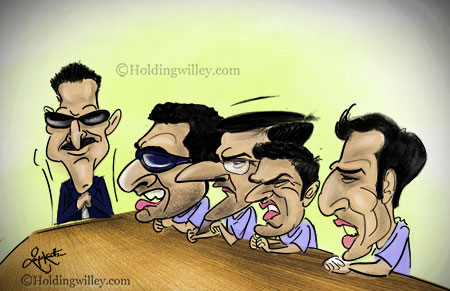 This past fortnight has been a good one for retired Indian cricketers. First came the announcement that the BCCI was mulling over an advisory panel, and then they actually made good on the promise, roping in Sachin Tendulkar, VVS Laxman and Sourav Ganguly. Elsewhere, Ravi Shastri continues to be the Indian team’s director and his contribution to the team was praised by Test captain Virat Kohli in a highly publicized interview.
This past fortnight has been a good one for retired Indian cricketers. First came the announcement that the BCCI was mulling over an advisory panel, and then they actually made good on the promise, roping in Sachin Tendulkar, VVS Laxman and Sourav Ganguly. Elsewhere, Ravi Shastri continues to be the Indian team’s director and his contribution to the team was praised by Test captain Virat Kohli in a highly publicized interview.
The mind goes back to the time when Shastri was appointed last year, in the aftermath of the 3-1 Test series defeat in England. At the moment, it was seen as an appeasement move, given his proximity to the all-powerful then BCCI president N Srinivasan. With the support staff also changed, it remained to be seen how he would help the Indian team get out of the overseas’ quagmire.
In that light, the results produced haven’t been too great. This new support staff oversaw the ODI series against England (won), the home ODI series against West Indies and Sri Lanka (both won), the Australian tour (both Test series and ODI tri-series lost) and the ODI World Cup (semi-final loss). This report card doesn’t really make for good reading.
Yet, there is another way of looking at things, and that is in how Kohli and his ilk have showered praises on them. The coaching methods of Sanjay Bangar, R Sridhar and B Arun might not appear too different from those of Joe Dawes and Trevor Penney at first glance. After all, they were under the guidance of Duncan Fletcher.
Language was perhaps the biggest differentiator. Yes, the majority of this Indian team isn’t too fluent when it comes to spoken English, but that doesn’t necessarily mean they had trouble informing the coaches about the issues they were facing. Even so, when that over-riding factor is taken away, there is a certain comfort level that comes up without putting in any extra effort. It is the ease with which this comfortable equation was achieved that helped the dressing room most.
Herein, Shastri’s role gains prime significance. His commentary skills may have taken a downward curve over the past few years, but his skill of reading the game is sharp as ever. And thus, when it comes to conversing with this set of players and getting his point across in a language that they understood, there is no better persona in Indian cricket today. He doesn’t mince his words, doesn’t use fanciful terms, and nothing about his explanation is complicated. All of it is simple, and direct.
“
A young bunch of players who believe immensely in their abilities only need to hear the right words, and this is precisely what Shastri has done. His frank conversations with this set of cricketers, combined with Kohli’s aggressive stance, have given this team a unique direction, amply visible during the Test series Down Under.
”
This raises two very pertinent points, both related to each other. First, it brings Fletcher’s role under sharp focus. Now his report card since 2011 makes for abject reading, but he did help the team on two counts – a) focus on fielding and b) helping these young batsmen with their technique. The Test series in England perhaps remains a blip on both those counts, but a first-time experience in those tough conditions can rile any cricketer, let alone ones from India.
The underlying point is that Shastri (or someone else like him) is good enough to shape the team’s future direction. In the meantime, they do need a presence among the coaching staff, someone who takes the lead, assigns the support staff their roles, looks minutely at the technical flaws creeping in these players’ games, and so on. Someone who isn’t just around to give pep talk; rather someone who is there to chat intensely about the intricacies of cricket. The Indian team needs a head coach. Period.
This is where the second point comes in. None among Tendulkar, Laxman or Ganguly (nor even Dravid) actually qualify for this role. It can be argued that they are all Indian cricket’s greatest servants. True. It can be said that they have immense knowledge about the game. Yes. It can be asserted that they speak about it with passion, whether sitting in the commentary box or in different IPL dugouts as mentors. Fair enough.
But the bottom-line question is: what is their coaching experience? Look at the likes of Australia, England and South Africa, cricket’s top nations. They only entertain those coaching prospects who have certifiable experience. For example, Justin Langer, Tom Moody, Mikey Arthur, Jason Gillespie, etc. were in consideration for the England job. Sentiment cannot have any value in this consideration. Remember Kapil Dev’s coaching stint?
That is why, the BCCI’s move to only give the ex-cricketers an advisory role, keeping them away from the firing line only a full-blown coach experiences, is commendable. There is one more deed to be done though. The board should now describe, in full, what the role of this advisory committee will be, and give them full independence to act on it. That will encourage accountability, a notion that was lost on Indian cricket’s administration until recently.